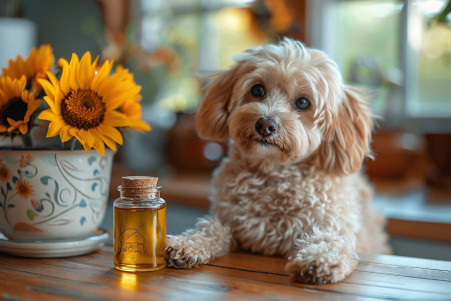Can Dogs Have Sunflower Butter? A Healthy Nut Butter Alternative
25 April 2024 • Updated 25 April 2024

If you're wondering whether sunflower butter is a good alternative for your dog, the answer is yes, especially if your dog has a peanut allergy or sensitivity. Sunflower butter is safe for dogs to eat in small amounts and can be a healthy addition to their diet, as it's packed with vitamins, minerals, and healthy fats.
In this article, we'll discuss the benefits and potential downsides of giving sunflower butter to dogs, drawing on information from veterinary nutritionists, pet food companies, and animal health groups. We'll cover the right portion sizes, potential nutritional issues, and fun ways to give your dog this nutritious nut butter as an occasional treat.
Can dogs have sunflower butter?
Nutritional Benefits of Sunflower Butter for Dogs
Sunflower butter is a nutritious option for dogs that offers a variety of essential vitamins, minerals, and fats. As noted by Blooming Culture, it is high in vitamin E, an antioxidant that can help regulate cholesterol and reduce inflammation. In fact, one tablespoon of sunflower butter contains 24% of a dog's daily requirement of vitamin E.
PetMD points out that sunflower butter is also a good source of magnesium, protein, and omega-6 fatty acids, which can all be good for a dog's skin, coat, and overall health. The USDA's nutritional data also shows that it contains phosphorus, copper, and a good amount of fiber, which can help with digestion.
Although sunflower butter is high in fat and should be fed in moderation, the fat is mostly unsaturated fat, according to Bonavita. The butter is also a good source of protein, which can help dogs meet their daily protein needs. In general, sunflower butter is a good choice for an occasional treat as long as it's fed in the right portion sizes.
Moderation and Portion Control
Because of its high fat and calorie content, sunflower butter should be given to dogs in moderation. Hepper suggests a rule of thumb of no more than 1 teaspoon per 10 pounds of body weight per day. For larger dogs, you can increase the amount slightly, and for smaller dogs, you can decrease it.
Dog Child says you should not exceed 1 tablespoon per 30 lbs of body weight per day. Obesity, pancreatitis, and other health problems can occur if you give your dog too much sunflower butter. Make sure to watch your dog's intake and adjust the portion size based on their specific needs.
Potential Dangers and Allergies
Although it's not common, some dogs may have an allergy to sunflower seeds or sunflower butter. Per Sidekick by Finn, symptoms of an allergic reaction can include vomiting, diarrhea, itching, and difficulty breathing. That said, sunflower butter should be introduced to dogs slowly to ensure that they don't have any of these reactions.
In addition, dog owners should steer clear of sunflower butter with added salt, sugar, or artificial sweeteners like xylitol, all of which can be toxic to dogs. The Poodle Forum explains that xylitol, in particular, can lead to a dangerous decrease in blood sugar and liver failure in dogs. Furthermore, dogs with pancreatitis or sensitive stomachs may not be able to eat sunflower butter at all.
Sunflower Seed Butter Dog Treats
If you make your own sunflower seed butter at home, you can control the ingredients and make sure it's safe for your dog. Alphafoodie explains that you can roast or sprout the sunflower seeds before blending to improve the taste and nutritional value. Just make sure to leave out any salt, sugar, or other ingredients that could be toxic to dogs.
You can also use homemade sunflower seed butter as an ingredient in other dog treat recipes, such as From Scratch Baking's Oat and Sun Butter Puppy Bites. Sukrin USA even offers a recipe for Homemade Dog Treats with Sunflower Seed Butter.
If you do make sunflower seed butter at home, make sure to keep it in the fridge and use it within a few weeks to ensure it stays fresh and tasty. But with a little effort, you can make a healthy, homemade treat that your dog will love.
Conclusion: Sunflower Butter as a Healthy Occasional Treat
Sunflowers themselves are not toxic to dogs, according to Greg's article. While the plants are safe, the garden environment can pose risks from pesticides or fertilizers. That said, it's important to remember that too much of any non-toxic plant can cause stomach upset, so it's important to keep an eye on your dog if they're around sunflowers.
Sunflower seeds are actually a nutrient-dense snack that dogs can enjoy in moderation. According to TrustedHousesitters.com, sunflower seeds and oil can be a good source of healthy fats, proteins, and a variety of vitamins and minerals. However, they should never be a replacement for a dog's regular diet and should only be added with the help of a vet.
While sunflower-based treats can be a good addition to your dog's diet, it's important to watch your dog around sunflowers and talk to your vet before adding sunflower-based treats to their diet. After all, even non-toxic plant material can cause vomiting and diarrhea if it's consumed in large quantities. As always, it's important to prioritize safety when introducing new foods to your dog.


